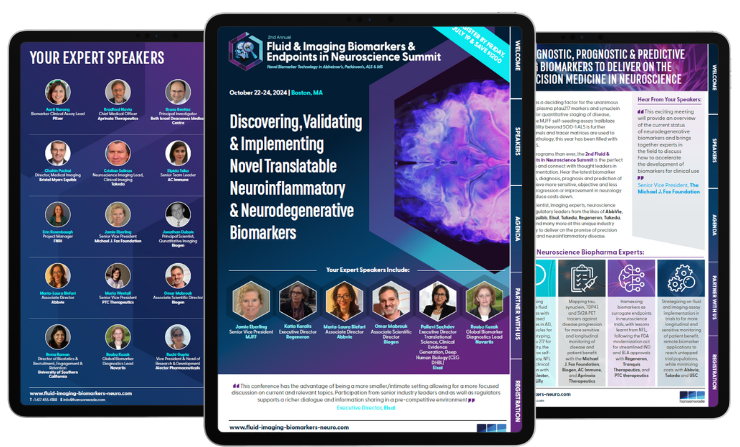7:00 am Coffee & Check-In
7:55 am Chair’s Opening Remarks
INTEGRATING OMICS WITH BIOLOGICAL UNDERSTANDING FOR EFFICIENT & SPECIFIC BIOMARKER ID
8:00 am Tracking Neuropsychiatric Change as an Early Marker of Alzheimer’s Disease: Tangible Biomarkers & Symptoms
Synopsis
- Exploring depression as an early marker of prodromal Alzheimer’s Disease to reflect disease pathology beyond amyloid and biological divergence
- Combining longitudinal omics data from patient cohorts with MDD to identify early markers of AD, determine AD susceptibility and identify risk factors within the patient population
8:30 am Integrating Multiomics with Longitudinal & Cross-Sectional Clinical Data from AD & PD Patients
Synopsis
- Integrating genomic, transcriptomic, metabolomic, and proteomic data from biofluids (plasma, CSF, and urine) and post-mortem brain tissue to determine multimodal signatures
- Performing a deep molecular characterization of genetically defined populations to identify potential novel biomarkers
- Identifying molecularly-defined clusters of patients with distinctive disease progression and clinical features using multi-omics approaches
9:00 am Panel Discussion: Multiomics, Longitudinal Data & Precision Medicine in the CNS: How Can we Get the Most Out of the Tools at Our Disposal?
Synopsis
- Harnessing proteomics to identify early signatures of risk factors for neurodegenerative and neuroinflammatory disease
- Redefining disease heterogeneity with discrete biomarker populations
- Building up a network of internal and external capabilities to get the most out of complex patient data, producing quantitative biological insights
10:30 am Morning Break & Speed Networking
Synopsis
This session is a great opportunity to introduce yourself to your CNS drug developer peers actively implementing and validating fluid and imaging biomarkers in their programs. This session is the ideal opportunity to get face-to-face time with key stakeholders in pharma and biotech grappling with biomarker ID and implementation to their neuroscience pipelines in 2024.
HARNESSING MASS SPECTROMETRY & ML MODELS FOR ASSAY VALIDATION & PREDICTION OF LONGITUDINAL OUTCOMES
11:30 am IPLCMS Hybrid Assays to Support Neurodegenerative Studies in Parkinson’s Disease
Synopsis
- Exploring assay validation: context of use, validation package, confirmatory experiments to determine precision of assay
- Utility of assays to robustly support LRRK2-directed therapeutics
- Advantages of this technique over traditional immunoassays
12:00 pm Application of Machine Learning Models to Predict Long Term Clinical & MRI Outcomes in Multiple Sclerosis
Synopsis
- Predicting long term clinical disability progression
- Optimizing patient selection strategies in progressive MS trials through enrichment
- Navigating regulatory requirements for implementation in prospective trials
12:30 pm Lunch & Networking
EXPLORING TRANSLATIONAL & CLINICAL UTILITY & PATIENT STRATIFICATION IN TRIALS FOR MORE CONFIDENT RELEVANCE OF DRUGS TO THE PATIENT
1:30 pm Exploring the Utility of APN1607 as a First In Class Diagnostic Marker for Tauopathies for Earlier Identification of Patients
Synopsis
- Discussing and reviewing landscape of imaging markers for tau for neurodegenerative disorders
- Discussing the biological properties of APN1607 as a novel first in class PET tracer for 3R and 4R tauopathies
- Reviewing the clinical results on the utility of APN1607 across the spectrum of 3R and 4R tauopathies including AD, PSP, FTD and CTE
- Exploring progress and challenges for development and approval of tau imaging agents
2:00 pm Diagnostic Accuracy of ptau217 & MTBR Tau in AL002 Phase 2 Patient Subset
Synopsis
- Plasma ptau217 performance of different assays
- CSF MTBR measurements in AL002 Phase 2
- Plasma ptau217 correlations with MTBR tau and Tau PET in a subset of AL002 Phase 2 patiens at baseline
2:30 pm Afternoon Break & Scientific Poster Session
Synopsis
This session is a great opportunity to introduce yourself to experts across leading CNS biopharma working with fluid and imaging biomarkers. Enjoy face-to-face time and share your work with many of the brightest minds, displaying scientific posters capturing the main advancements and challenges in validating diagnostic, prognostic and predictive biomarkers for CNS indications to establish meaningful business relationships
3:30 pm How Much Can we Rely on Human Cell-Based Immune Systems to Support & Implement Caveats of New Therapeutic Approaches?
Synopsis
- Reviewing a case study for in vitro systems to apply, move on and stratify patients to optimize drug development
- Exploring design for discovery, first in human and early clinical studies to meet expectations and requirements from the regulators following the FDA modernization act for IND and BLA approvals
- Exploring alignment of phenotypic changes, secretory and inflammatory responses in FTD modelling vs human data
4:00 pm Panel Discussion: Defining Biomarker Context of Use in Early on to Ensure Valuable Insights from Clinical Implementation into Neurology Trials
Synopsis
Critically evaluating correct and valuable applications of biomarkers for meaningful and actionable insights: target
engagement, patient stratification, diagnosis, prognosis and predicting patient outcome
• Addressing regulatory requirements and validation processes necessary for biomarkers in clinical trials and discuss
strategies for robust biomarker validation to ensure reliability and reproducibility of results across different patient
populations and trial phases
• Integrating biomarkers into clinical workflow for neurological trials, including sample collection, processing, analysis and
the need for standardized protocols
• Ensuring seamless communication between research and clinical teams to maximize utility and impact of biomarkers in a
areal world setting

